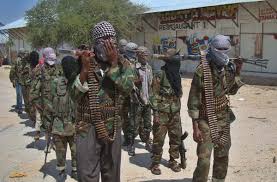Somalia: Al-Shabaab Steals Livestock From Middle Jubba Residents Suffering From Drought
Mogadishu — Al-Shabaab is ordering residents of Middle Jubba region to round up their livestock that survived the drought and turn them over to the militant group, Interim Jubba Administration (IJA) officials and residents told Sabahi.
Al-Shabaab, which still controls most of Middle Jubba region, has started collecting camels, cattle and goats in the towns of Buale, Jilib, Sakow and surrounding villages, according to Colonel Urdan Kilas Gurase of the IJA security forces.
“Al-Shabaab often targets camels, which are the most important animals that Somalis keep,” he told Sabahi. “The people they are robbing have lost most of their herds to the drought, and [the militants] are taking the only surviving animals from each family.”
Gurase said the administration has been receiving complaints daily from relatives of residents living in al-Shabaab-controlled areas about the group’s actions.
“As an administration we are planning to immediately liberate the drought-affected people whom al-Shabaab is forcefully robbing all of the time,” he said, adding that operations to clear al-Shabaab out of Middle Jubba region could take less than a month.
Mohamed Abdi, a 50-year-old elder from Jilib who declined to give his real name for security reasons, told Sabahi that al-Shabaab recently stole five camels from his mentally ill brother who lives in Nasriya village in Middle Jubba region.
“He used to own more than fifty camels, but my brother’s animals perished due to the severe drought that struck the region,” he said. “Al-Shabaab forcefully took his five remaining camels after he refused to comply with its demand when they ordered him to give up two of his camels.”
Abdi said he has been sending food to his brother and he contacted some of his relatives abroad, asking them to collect money so he can move his brother and his brother’s seven children from their village and bring them to Jilib.
“I have incurred a great burden that I cannot bear, but I would rather share my meagre resources with my brother and his children than let them die alone,” he said.
Twisting Islam to justify robbery:
“When a person who has been greatly impacted by the drought is robbed of the little that he is left with, I can say that it is an action that is far from the [principles] of Islam,” Farah told Sabahi. “But these al-Shabaab men did not have a religion to begin with.”
“They did not give us any justification for taking our animals,” he said. “They told us, ‘The animals are for zakat contributions you should have paid a long time ago, so we are collecting them now.'”
Farah said al-Shabaab is experiencing serious financial difficulties and whenever it cannot feed its fighters, they rob civilians.
“What al-Shabaab has done is not lawful but simply criminal,” he said, adding that the militants know they can get away with it because civilians are not armed and can be easily overpowered.
After being robbed of their surviving animals — their only hope of sustaining their families after the drought — residents feel resigned, Farah said. “Now we no longer fear al-Shabaab because there is no life left for a person who has had all his animals taken away.”
Farah called on the Somali government and the African Union Mission in Somalia (AMISOM) troops to liberate the areas al-Shabaab controls in Middle Jubba region.
“The abuse they are inflicting on the people is unbearable,” he said. “As the elders from Middle Jubba region, we can say that there is nothing left for us but to be killed by al-Shabaab.”
Sheikh Ahmed Dahir, a cleric who lives in Mogadishu’s Hamarweyne district, said Islam prohibits transgressions and it is unlawful to rob another person’s livestock.
“As Somali clerics we have repeatedly talked about al-Shabaab’s evil acts of robing other people’s livestock,” he told Sabahi. “It is prohibited in Islam to steal another person’s wealth whether that person is a Muslim or not. Al-Shabaab’s [actions] have no basis in Islam.”
By Fuad Ahmed+/A
